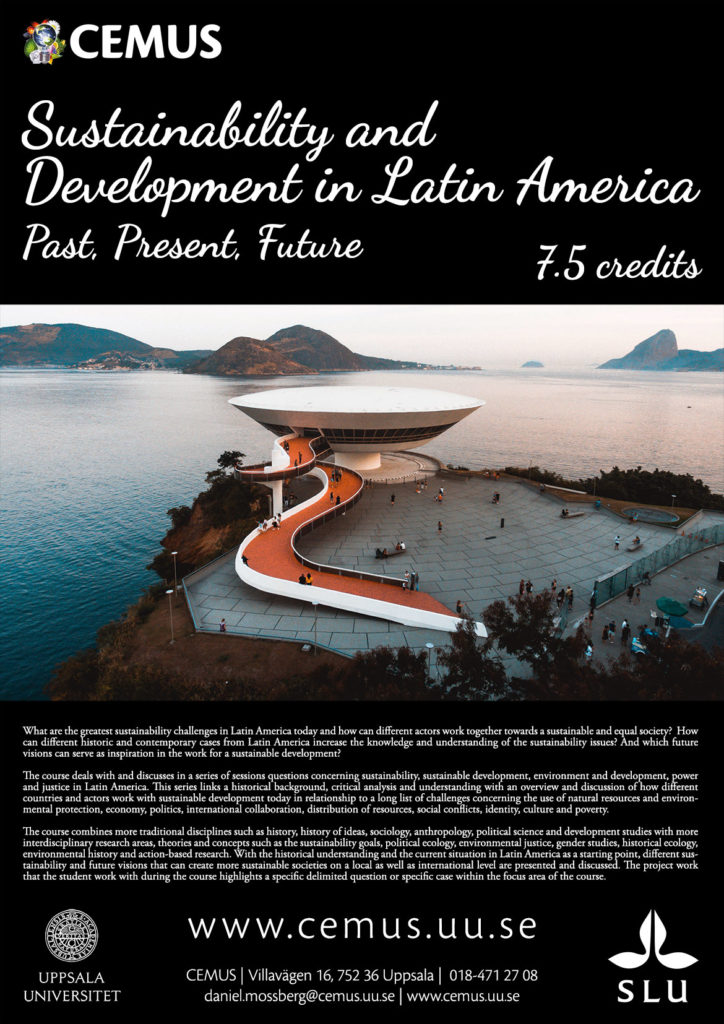Autumn 2021, 25%, Campus, Evening
Application at antagning.se »
Start date: 30 August 2021
End date: 16 January 2022
Application Deadline: 15 April 2021
Enrolment Code: UU-19514 Application
Language of Instruction: English
Location: Uppsala
Selection: Higher education credits (maximum 165 credits)
Entry Requirements: 60 credits
Fees: If you are not a citizen of a European Union (EU) or European Economic Area (EEA) country, or Switzerland, you are required to pay application or tuition fees. Formal exchange students will be exempted from tuition fees, as well as the application fee. Read more about fees.
Application Fee: SEK 900
Tuition fee, first semester: SEK 16250
Tuition fee, total: SEK 16250
About the course
What are the greatest sustainability challenges in Latin America today and how can different actors work together towards a sustainable and equal society? How can different historic and contemporary cases from Latin America increase the knowledge and understanding of the sustainability issues? And which future visions can serve as inspiration in the work for a sustainable development?
The course deals with and discusses in a series of sessions questions concerning sustainability, sustainable development, environment and development, power and justice in Latin America. This series links a historical background, critical analysis and understanding with an overview and discussion of how different countries and actors work with sustainable development today. This is done in relation to challenges concerning the use of natural resources and environmental protection, economy, politics, international collaboration, distribution of resources, social conflicts, identity, culture and poverty.
The course combines more traditional disciplines such as history, history of ideas, sociology, anthropology, political science and development studies. The course also includes interdisciplinary research areas, theories and concepts such as the sustainability goals, political ecology, environmental justice, gender studies, historical ecology, environmental history and action-based research. With the historical understanding and the current situation in Latin America as a starting point, different sustainability and future visions that can create more sustainable societies on a local as well as international level are presented and discussed. The project work that you work with during the course highlights a specific delimited question or specific case within the focus area of the course.
Welcome to Sustainability and Development in Latin America 2019!
Hello everyone, we hope that you have had a great summer! We are very excited to start this new course with you. Below you will find important information about the course, which includes the literature, the schedule, as well as some other CEMUS related events. Please take your time to read this information, so that we are all on the same page throughout the course.
Please keep checking this course portal for the latest updates and remember that you can always write to us, and we will get back to you as soon as we can.
André Dutra: andre.dutra@cemus.uu.se
Franklin Martínez: franklin.martinez@cemus.uu.se
Thank you, and see you around!
Course Information
Here you can find the Welcome Letter for the course, which includes an overview of the mandatory literature, sessions, and examination.
Here you can find a Schedule for the course.
Here you can find the Literature schedule, with the dates in which – we hope – you guys have read the mandatory readings. This schedule will be updated with some more recommended readings, relevant to the session that will take place that week. Be sure to check it out regularly!
Schedule & Course Info
Literature
Three Course Books:
- Deere, Carmen Diana Royce, Frederick S. (2018). Rural social movements in Latin America : organizing for sustainable livelihoods
Gainesville: University Press of Florida.
Find in the library - Galeano, Eduardo. (1997). Open Veins of Latin America : Five Centuries of the Pillage of a Continent (25th Anniversary Edition)
Find in the library
- Carbonnier, G., Campodónico H. & Vázquez S. T. (2017). Alternative Pathways to Sustainable Development: Lessons from Latin America.
Find in the library
Assignment Instructions
- Instructions will be uploaded on Studium.
Lecture Material
- Relevant lecture material will be uploaded on Studium.
.
Sessions
First session – Environmental History of Latin America
Lecturer: Adam Wickberg-Månsson.
Some recommended material:
Crosby, Alfred W. (1972). The Columbian exchange; biological and cultural consequences of 1492. Westport, Conn.: Greenwood Pub. Co., pages 3-29.
Wickberg, Adam: Plus ultra: Coloniality and the mapping of American nature-culture in the empire of Philip II. In: NECSUS. European Journal of Media Studies, Jg. 7 (2018), Nr. 2, S. 205–227. DOI: http://dx.doi.org/10.25969/mediarep/3447
Second session – Development of/in Latin America
Lecturer: Matilda Baraibar.
Mandatory literature available on Studentportalen.
Third session – Sustainability in Latin America
Lecturer: Vivian Ribeiro.
Some recommended material:

